

Table of Contents
- Latest News on Property Tax in Maharashtra
- Introduction
- Components of Maharashtra Property Tax
- Key Aspects of Maharashtra Property Tax
- Maharashtra Property Tax Assessment
- MCGM Property Tax Calculation
- Property Tax Categories in Maharashtra
- Property Tax Payment in Mumbai, Maharashtra
- Property Tax Payment in Thane, Maharashtra
- Property Tax Payment in Navi Mumbai, Maharashtra
- Property Tax Payment in Pune, Maharashtra
- Property Tax Payment in Nagpur, Maharashtra
- Paying Rural Property Tax in Maharashtra:
- Exemptions from Property Taxes in Rural Maharashtra
- Importance of Compliance
- Conclusion
- Faq's
Latest News on Property Tax in Maharashtra
The Union Budget 2025 introduced a notable change allowing taxpayers to claim a nil annual value for up to two self-occupied properties. Previously, owning a second property, even if unoccupied, attracted tax based on its deemed rental value. This adjustment simplifies tax compliance and offers financial relief to property owners.
2. Property Tax Rates in Pune and Pimpri Chinchwad:
The municipal corporations of Pune and Pimpri Chinchwad have proposed maintaining the current property tax rates for the financial year 2025-26, providing stability for property owners in these regions.
3. Revised Industrial Property Tax in Nashik:
The Nashik Municipal Corporation has reinstated the industrial property tax slab, reducing the rate from ₹44 per square meter per month to ₹13.2 per square meter per month. This revision offers substantial relief to approximately 1,000 industries established or expanded after April 1, 2018.
Introduction
As the vibrant state of Maharashtra undergoes rapid urbanization, the centrality of property taxes in upholding local governance and fostering development becomes increasingly paramount. Acting as the financial lifeblood for municipal corporations and councils, property taxes play an instrumental role in financing essential services, catalyzing infrastructure projects, and sustaining civic amenities that contribute to the overall well-being of residents.
This comprehensive exploration seeks to unravel the intricate details of Maharashtra's property tax system, shedding light on its multifaceted components, nuanced assessment methods, and the pivotal role it assumes in shaping the dynamic urban landscape of the state. By delving into these complexities, we aim to provide a comprehensive understanding of the mechanisms that drive the financial underpinnings of local governance and development initiatives in Maharashtra.
Components of Maharashtra Property Tax
Land Tax:
- The Maharashtra Land Revenue Code of 1966 serves as the bedrock of Maharashtra's property tax system. This legislation intricately regulates the assessment and collection of land revenue, a tax meticulously computed based on several factors. These factors include the area of the land, its classification, and other pertinent considerations. Land tax, therefore, emerges as a pivotal element within the state's revenue collection framework, playing a significant role in bolstering local governance initiatives.
- The assessment of land tax involves a thorough examination of the unique characteristics of each parcel of land, ensuring a fair and equitable contribution from property owners. This comprehensive approach underscores the importance of land tax as a crucial source of revenue that directly contributes to the financial sustenance of local governance structures.
Property Tax:
- Moving beyond land tax, the property tax paradigm takes center stage in the financial architecture of municipal finance. Extending its purview to residential, commercial, and industrial properties, property tax assumes a multifaceted role in funding various essential aspects of community development. These aspects encompass local infrastructure projects, efficient waste management systems, and a spectrum of civic amenities designed to enhance the overall quality of life for residents.
- The complexity of the property tax system lies in its adaptability to the diverse nature of properties that fall within its ambit. Different properties demand distinct assessment methodologies, reflecting their varied characteristics and usage patterns. This diversity gives rise to nuanced tax rates, which vary across municipalities to address the unique needs and challenges posed by different regions.
- Property tax becomes a dynamic mechanism that not only ensures a sustainable revenue stream for municipalities but also actively contributes to the targeted development of communities. Its adaptability and responsiveness to the diverse real estate landscape in Maharashtra make property tax a cornerstone in the financial ecosystem, facilitating the ongoing growth and progress of the state's urban and rural areas alike.
Key Aspects of Maharashtra Property Tax
Assessment and Collection:
In the realm of Maharashtra's property tax, the assessment and collection process unfolds as a decentralized operation, with municipal corporations and councils assuming jurisdictional control. This localized approach tailors solutions to the unique challenges and requirements of each area, ensuring a fair and accurate representation of property values. Periodic assessments serve as a crucial mechanism to align property values with the dynamic currents of the market, forming the foundation for determining tax liability. By empowering local entities, this approach establishes a responsive system that resonates with the distinctive features of diverse regions.
Property Tax Calculation:
Maharashtra's property tax calculation hinges on a delicate balance between the 'Unit Area Method' and the 'Capital Value Method.' The former meticulously considers factors such as built-up area, construction type, and usage, weaving a comprehensive tapestry that captures the essence of each property. On the other hand, the 'Capital Value Method' zeroes in on the property's market value, offering an alternative perspective on taxation. The intricate nature of these calculations necessitates a nuanced understanding of the local property dynamics and market trends. This dynamic interplay between methodologies ensures a fair and equitable assessment, acknowledging the diverse nature of properties within the state.
Online Payment and Assessment:
In a concerted effort to embrace the digital era, numerous municipalities in Maharashtra have ushered in online systems for property tax assessment and payment. Property owners are now empowered to navigate municipal websites seamlessly, gaining access to comprehensive assessments, facilitating payments, and staying abreast of any alterations to tax regulations. This digital transformation not only enhances transparency in the taxation process but also significantly improves accessibility for property owners, aligning the state with the evolving landscape of technological advancements.
Exemptions and Rebates:
Acknowledging the diverse tapestry of property ownership, Maharashtra's property tax system incorporates a thoughtful array of exemptions and rebates. Properties dedicated to charitable or religious purposes, as well as those under the ownership of defense personnel, may qualify for specific benefits. In a bid to promote compliance and punctuality, municipalities may further incentivize property owners through targeted exemptions and rebates, fostering a cooperative environment and aligning fiscal policies with broader socio-economic objectives. This strategic integration of exemptions and rebates underscores the system's adaptability to cater to the diverse needs and circumstances of property owners in Maharashtra.
Maharashtra Property Tax Assessment
The method of property assessment in Maharashtra for property taxes, as outlined in Section 154 of the MMC Act, involves determining the rateable value of each building or piece of land subject to taxation. Instead of factoring in allowances for repairs or other considerations, the rateable value is established by deducting 10% from the annual rent, representing the anticipated rent from year to year.
In the contemporary scenario, constructing a building explicitly for leasing purposes is atypical. The department has identified specific pockets of locality in each ward and furnished "Residential Letting Rates (Annexure H) for each Pocket" to ascertain the annual rent at which a building can reasonably be expected to be leased annually. With due consideration to the "Residential Letting Rate," the annual rent and rateable value of the property are determined as follows. It's noteworthy that most properties are typically constructed for individual owner occupancy.
The process involves multiplying the monthly rental by 12 and then subtracting a 10% statutory deduction to arrive at the rateable value of the property. This approach ensures a fair and standardized assessment, taking into account local letting rates and aligning with the predominant usage of properties constructed for personal ownership rather than exclusive leasing.
MCGM Property Tax Calculation
Determining a property's annual value under the MCGM property tax calculation involves considering various factors that collectively influence the property's financial assessment. These factors encompass the property's location, type (residential, commercial, or land), provided amenities, construction age, construction type (multistory, single floor, or kutcha house), occupancy status, carpet area, and Floor Space Index (FSI).
Local organizations create a comprehensive formula, taking into account these variables, to establish the property tax amount owed by residents in Mumbai. The calculation involves multiplying the tax rate by the capital value, where a portion of the capital value is utilized in determining property taxes.
The capital value itself is derived from the base value, calculated as the Base Value/Market Value multiplied by the built-up area, age, type of building, and Ready Reckoner. Additionally, it includes factors like the floor factor and use category. This intricate calculation assigns weights to various elements, such as the construction type, age of the structure, and user group, creating a nuanced and tailored approach to property tax assessment.
Refer the table
|
Factors for Determining Annual Property Value |
|
|
Influencing Variables |
Property location, type (residential, commercial, or land), amenities, construction age, construction type, occupancy status, carpet area, and Floor Space Index (FSI). |
|
Calculation Components |
Multiplication of tax rate by the capital value, with a portion of the capital value utilized in property tax. |
|
Capital Value Calculation |
Base Value/Market Value multiplied by built-up area, age, type of building, Ready Reckoner, floor factor, and use category |
|
Weighted Variables |
Construction type, age of the structure, user group, assigning specific weights for a nuanced assessment. |
Property Tax Categories in Maharashtra
Maharashtra's property tax structure is categorized into two primary forms: Urban and Rural
Urban Areas Property Tax in Maharashtra is managed through 28 municipal corporations across the state.
Below is a list of websites for various municipal corporations in Maharashtra where property tax payments can be processed.
|
Sr. No. |
Municipal Corporation |
Property Tax Payment Website |
|
1 |
Brihanmumbai Municipal Corporation |
|
|
2 |
Thane Municipal Corporation |
|
|
3 |
Kalyan Dombivali Municipal Corporation |
|
|
4 |
Mira Bhayander Municipal Corporation |
|
|
5 |
Bhiwandi Nizampur Municipal Corporation |
|
|
6 |
Navi Mumbai Municipal Corporation |
|
|
7 |
UlhasNagar Municipal Corporation |
|
|
8 |
Panvel Municipal Corporation |
|
|
9 |
Sangli Miraj Kupwad Municipal Corporation |
|
|
10 |
Ahmednagar Municipal Corporation |
|
|
11 |
Vasai Virar Municipal Corporation |
|
|
12 |
Kolhapur Municipal Corporation |
|
|
13 |
Dhule Municipal Corporation |
|
|
14 |
Pimpri Chinchwad Municipal Corporation |
|
|
15 |
Jalgaon Municipal Corporation |
|
|
16 |
Solapur Municipal Corporation |
|
|
17 |
Aurangabad Municipal Corporation |
|
|
18 |
Pune Municipal Corporation |
|
|
19 |
Parbhani Municipal Corporation |
|
|
20 |
Ichalkaranji Municipal Corporation |
|
|
21 |
Akola Municipal Corporation |
|
|
22 |
Nashik Municipal Corporation |
|
|
23 |
Nanded Waghala Municipal Corporation |
|
|
24 |
Chandrapur Municipal Corporation |
|
|
25 |
Malegaon Municipal Corporation |
|
|
26 |
Nagpur Municipal Corporation |
|
|
27 |
Latur Municipal Corporation |
|
|
28 |
Amravati Municipal Corporation |
Property Tax Payment in Mumbai, Maharashtra
Visit the MCGM website: Access the MCGM website by following this link: MCGM Website
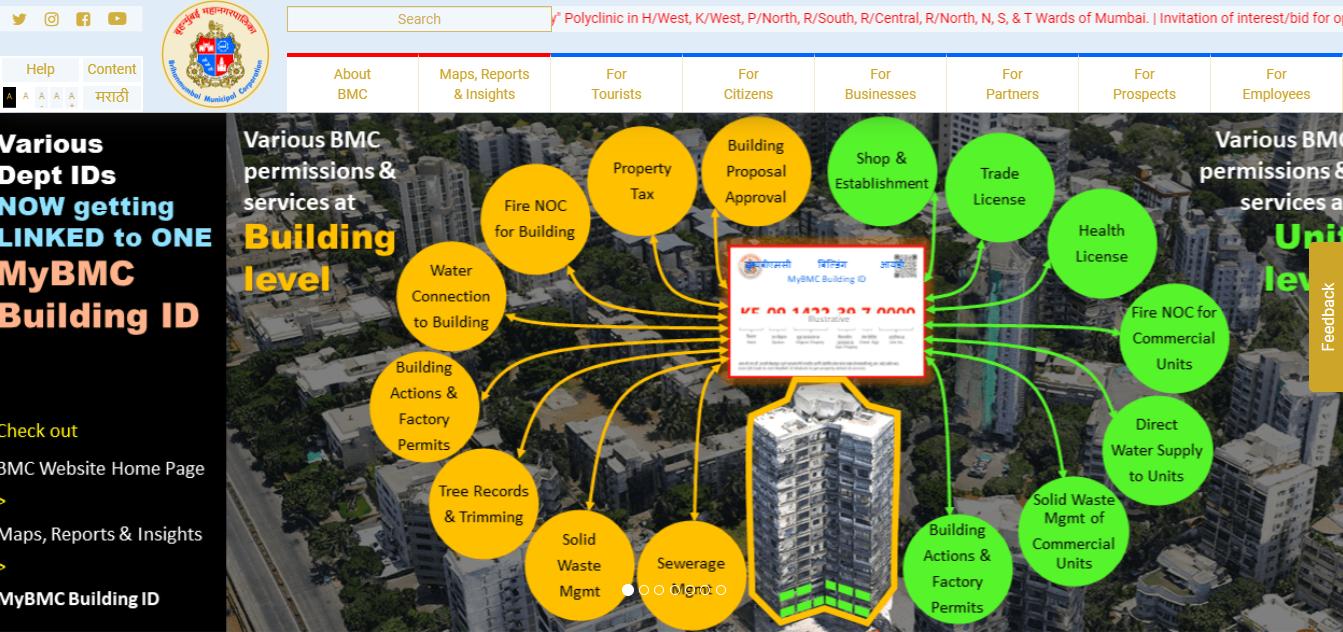
Note: You will be directed to a different website once you click on
For Citizens-Pay-Property Tax: https://www.mcgm.gov.in/irj/portal/anonymous
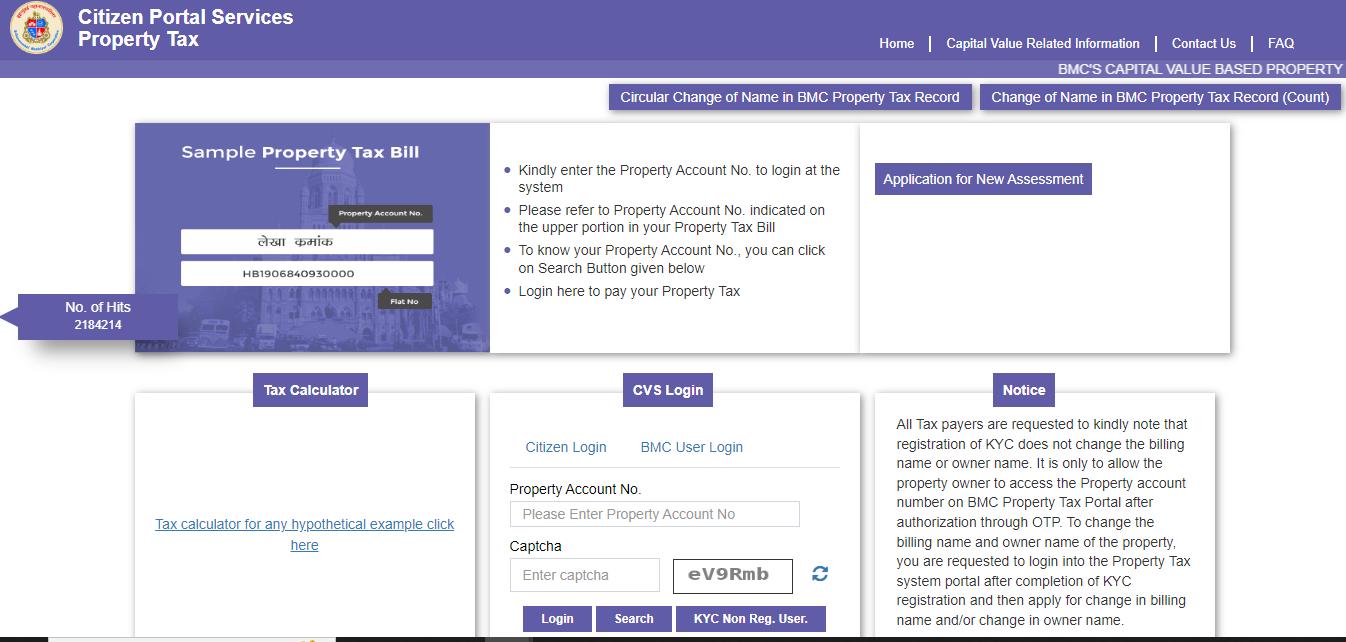
- Provide Information: Enter the captcha along with your Property Account number.
- Review Property Details: A presentation of the property details will be displayed. Verify the information, then input the tax amount. The payment follows the FIFO (First In, First Out) method. Payment options include credit or debit cards, net banking, or a combination of both.
- Generate Receipt: Upon successful payment processing, a receipt will be generated for future reference.
This streamlined process ensures a convenient and efficient means for urban residents in Maharashtra, especially in Mumbai, to fulfill their property tax obligations through the online platform provided by the Municipal Corporation of Greater Mumbai (MCGM).
Property Tax Payment in Thane, Maharashtra
For a swift online payment of TMC property tax, follow these steps by visiting the Thane Municipal Corporation (TMC) website: https://propertytax.thanecity.gov.in/
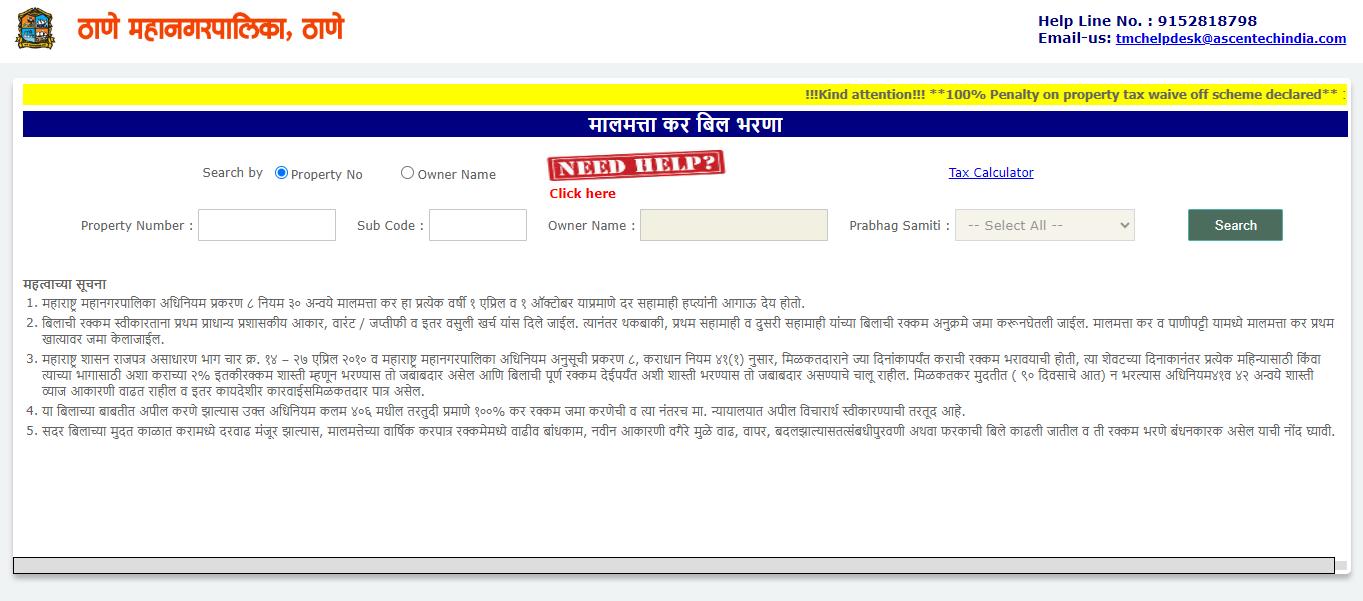
- Create an Account: Begin by creating an account on the TMC website and log in to pay your annual property tax bill at TMC Property Tax Payment.
- Language Selection: Choose your preferred language between Marathi or English.
- Provide Information: On the main screen, fill in the required details, including the property number, subcode, and your name.
- Check Amount: Click on "Search" to view the payable amount. Payment options encompass credit cards, debit cards, and online banking.
- Generate Invoice: Upon successful payment, an invoice will be issued for future reference.
This streamlined process ensures a hassle-free experience for residents in Thane, Maharashtra, enabling them to efficiently settle their property tax dues through the official Thane Municipal Corporation website.
Property Tax Payment in Navi Mumbai, Maharashtra
Follow these simple steps to pay your property taxes in Navi Mumbai:
Visit Official Website: Go to the Navi Mumbai government's official website for property tax payments at https://www.nmmc.gov.in/property-tax2
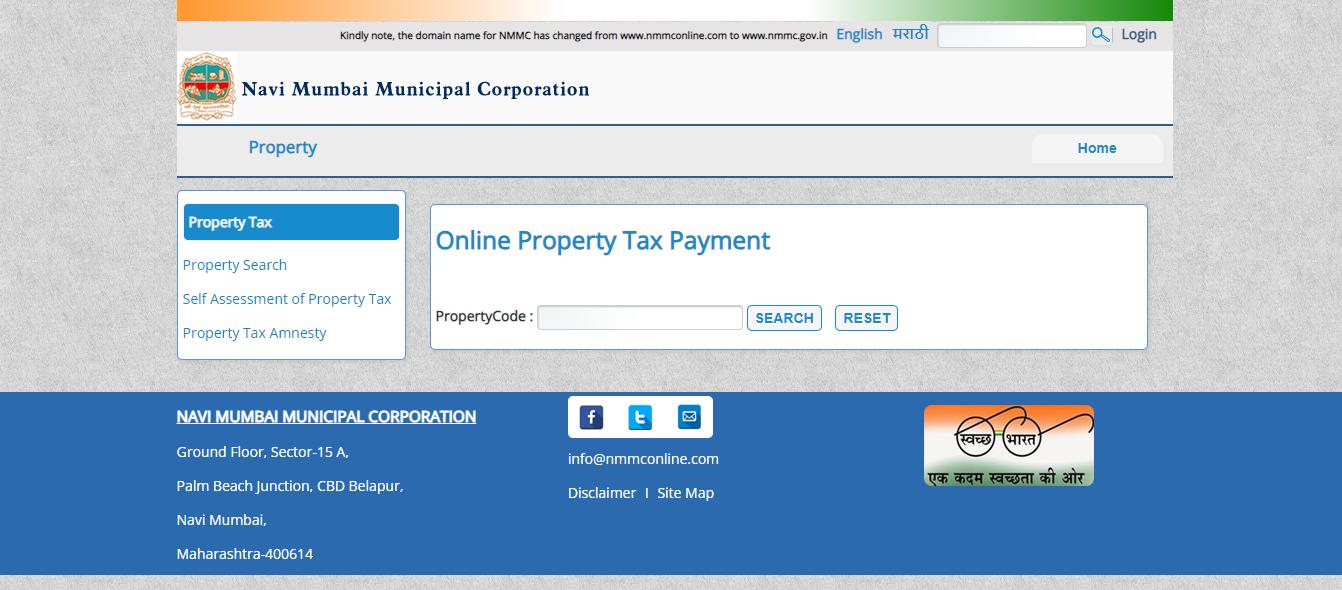
- Select Property Tax: Choose the Property Tax option and enter your property code. Click the SEARCH button to proceed.
- Review Property Details: Explore a page displaying property details, including the owner's name, any fines, and the outstanding amount.
- Online Payment: Click on 'Pay Online' on the landing page and select your preferred payment option.
- Transaction Completion: After the payment, you will receive a transaction reference number. Additionally, you have the option to print your challan for future reference.
This straightforward process allows residents in Navi Mumbai to conveniently settle their property tax obligations through the official Navi Mumbai Municipal Corporation website.
Property Tax Payment in Pune, Maharashtra
The Pune Municipal Corporation (PMC) streamlines the process of checking unpaid property tax status and offers various payment options, including a 2% rebate for online payments.
Accessing property tax information and making payments can be achieved through two convenient options.
Option 1: Online Payment
Visit the dedicated online payment link: https://propertytax.punecorporation.org/
Select the online option and proceed with your chosen payment method.
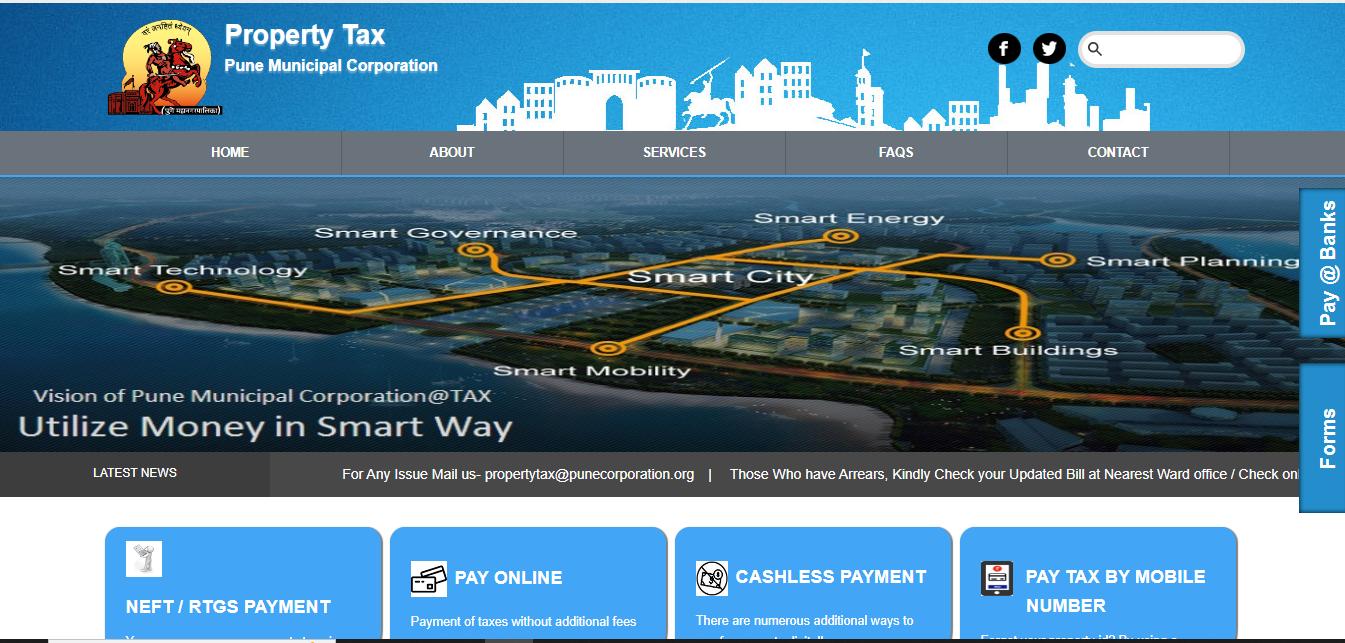
Option 2: Official PMC Government Website
Visit the PMC's official government website: https://www.pmc.gov.in/en?main=marathi
Select "Online Services" from the drop-down menu, leading you to the property tax information page under "Pay Property Tax."
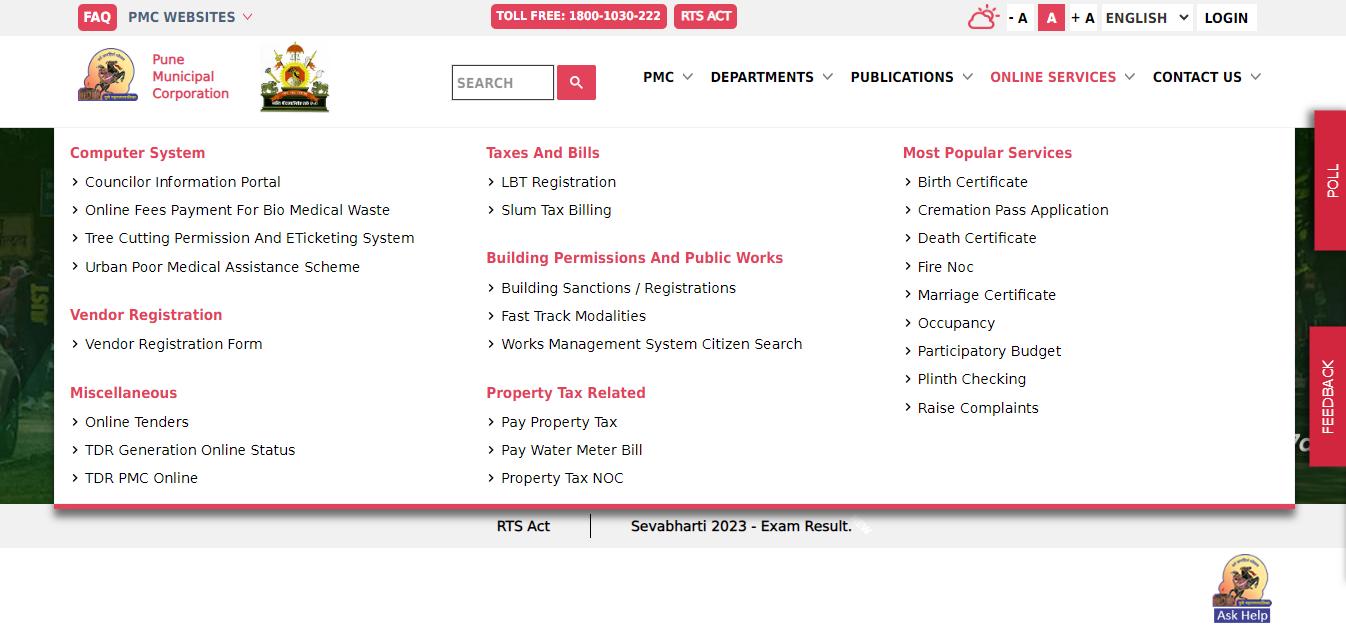
- On the landing screen, click "Pay online" and submit your property details, including property type, Section ID, Peth ID, and Account No.
- Enter your Pune property tax payment information, ensuring the accuracy of your email address and mobile number.
- Select your preferred payment mode and complete the transaction.
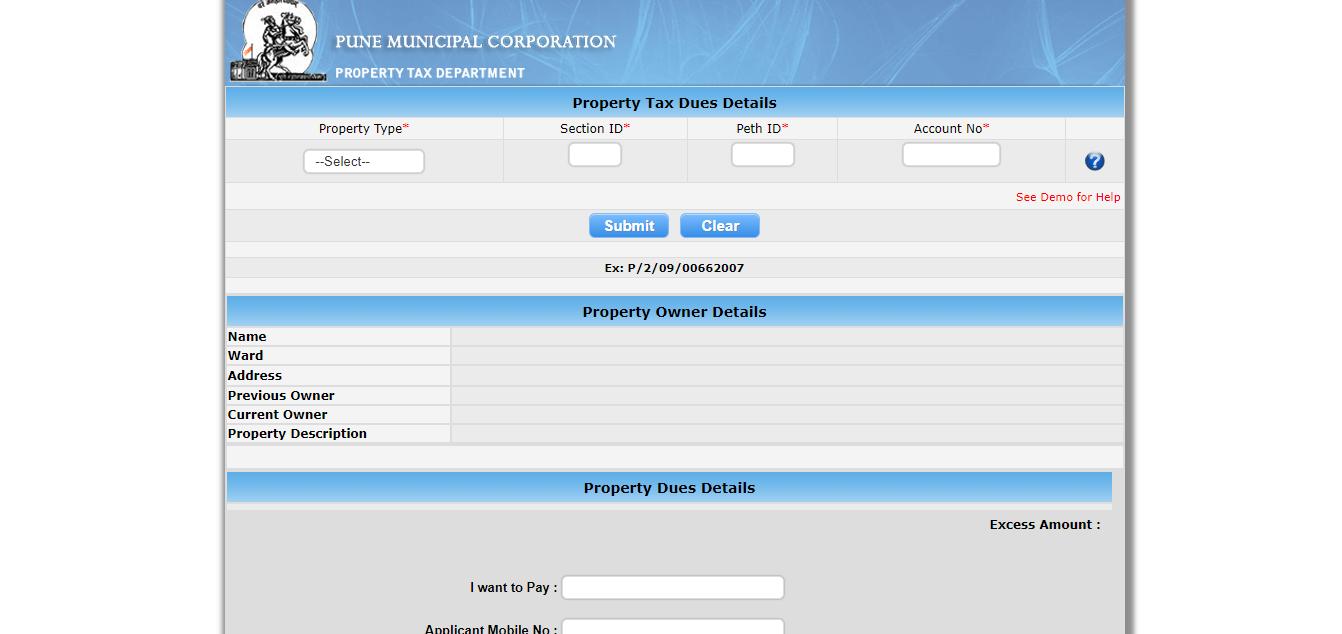
By offering these user-friendly options, PMC ensures a seamless experience for residents in Pune to stay updated on their property tax status and conveniently settle their dues through online platforms.
Property Tax Payment in Nagpur, Maharashtra
Follow these straightforward steps to pay your property taxes in Nagpur through the Nagpur Municipal Corporation's website: https://www.nmcnagpur.gov.in/
Step 1: Navigate to Nagpur Municipal Corporation's homepage.
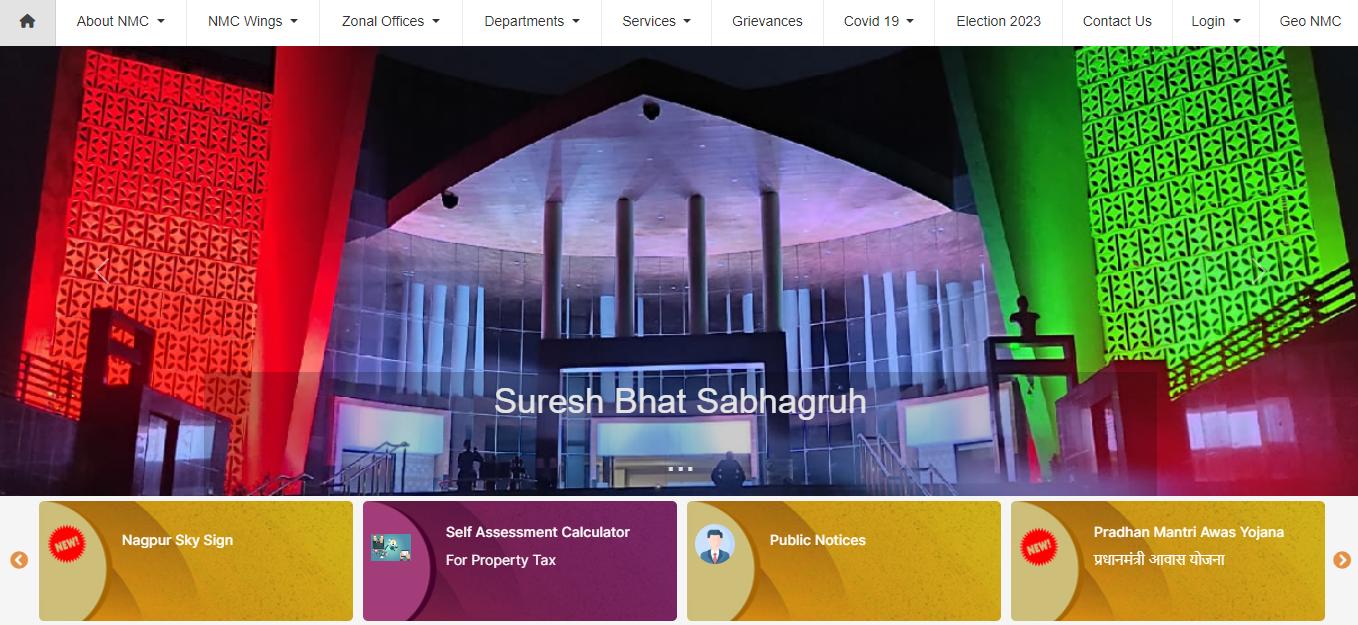
Step 2: Pay your taxes and print a receipt by selecting Services > Property Tax. You will be directed to a new webpage.
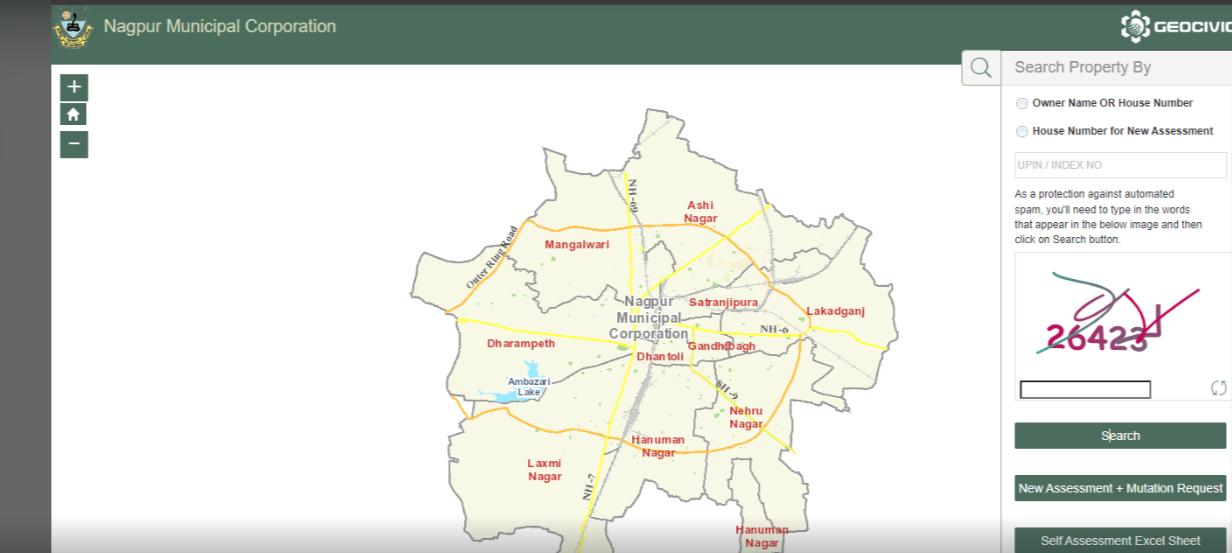
Step 3: Enter your Index number and captcha, then click the "Submit" button. Property details will be displayed.
Step 4: On the right side of the page, find the 'Action' tab. Choose 'pay tax' from the drop-down menu next to 'Choose.'
Step 5: Details about your Nagpur property taxes will be shown. You can pay property taxes for up to five years, even though it is required annually. Opt for the 'full' payment option to be eligible for a rebate when paying the entire property tax amount at once.
By following these steps, residents in Nagpur can efficiently navigate the online property tax payment process, ensuring ease and convenience through the Nagpur Municipal Corporation's official website.
Paying Rural Property Tax in Maharashtra:
The Rural Development & Panchayat Raj Department, Government of Maharashtra, oversees the collection of property tax in rural or Gramin districts. Property owners in Maharashtra can conveniently pay gram panchayat property tax through offline or online methods.
Offline Payment:
Visit any office of the Rural Development & Panchayat Raj Department or a recognized bank branch to make an offline payment.
Online Payment:
Visit the official Rural Development & Panchayat Raj Department website: https://mh.gov2egov.com/GeneralPages/HomeNew.aspx
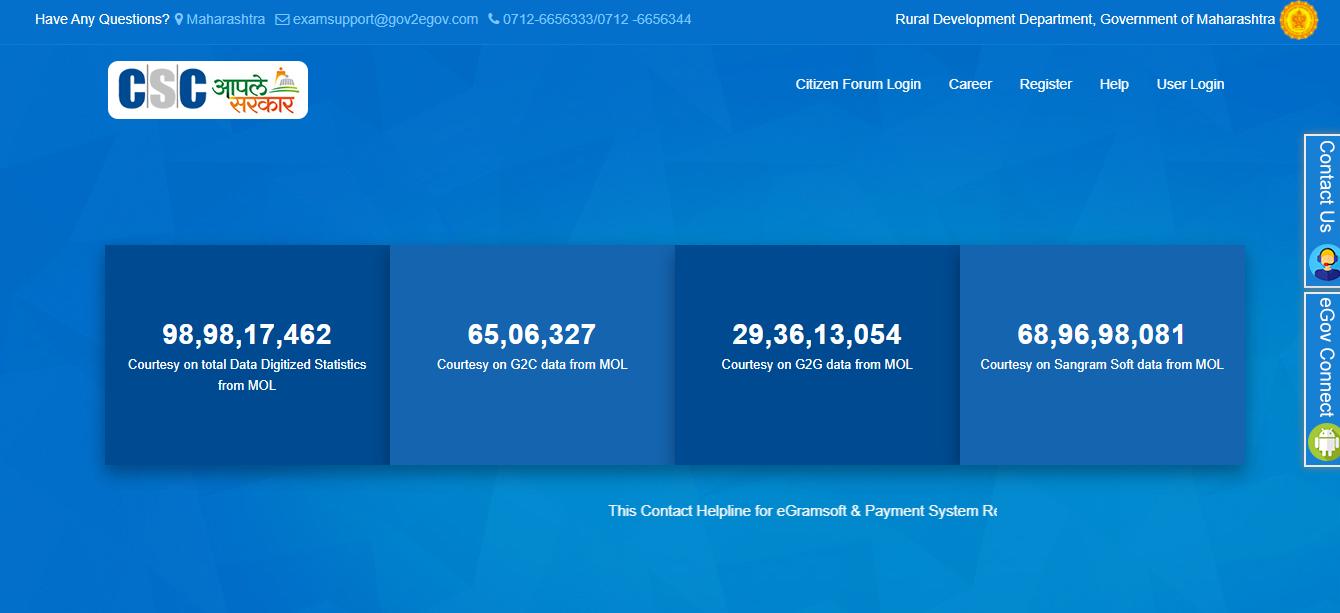
- Click on "Citizen Forum Login."
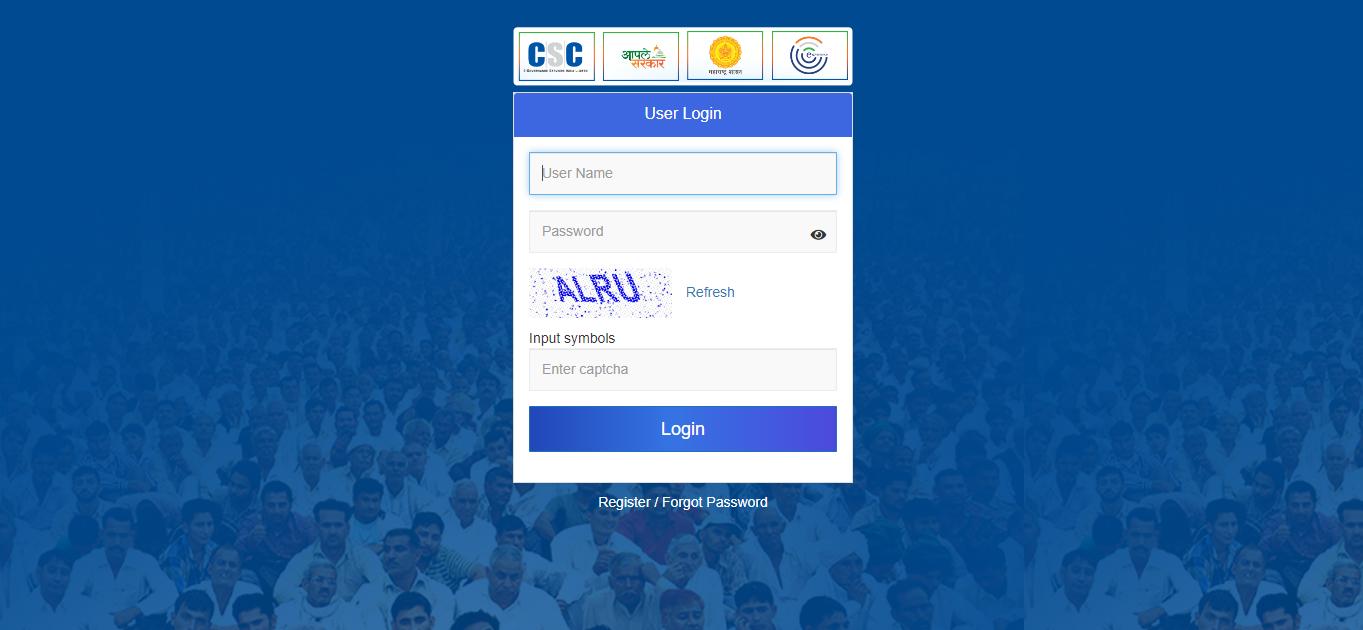
- If not registered, complete the registration by providing your name, gender, email address, phone number, and UID number.
- Obtain login credentials by providing contact information and verifying your identity.
- Log in to the website and select the option to pay property taxes.
- Enter details such as Zilla, Taluk, Gram Panchayat, and others.
- After providing the information, a screen displaying property tax details will appear.
- Click on "Pay Property Tax" to proceed to the payment gateway.
- Choose a payment method and complete the tax payment.
By following these steps, property owners in rural Maharashtra can efficiently fulfill their gram panchayat property tax obligations through the user-friendly online platform provided by the Rural Development & Panchayat Raj Department.
Exemptions from Property Taxes in Rural Maharashtra
As per sub-rule (1) of the Maharashtra Village Panchayat Act, the following lands and structures are exempt from taxation:
(a) Land and structures owned by a local government, intended solely for the benefit of the community without financial gain.
(b) Government-owned lands and structures, regardless of their use for profit.
(c) Properties and structures exclusively used for charitable, educational, or religious purposes.
(d) Residential structures of Military Personnel, including gallantry or non-gallantry medal winners, as well as their widows or dependents, provided the applicant presents a certificate from the District Sainik Welfare Officer confirming their status.
(e) Property owned by a member of the US Technical Cooperation Mission not utilized or intended for commercial gain.
(f) Land in the Hilly & Tribal region is exempt from taxation unless used for commercial, touristic, or industrial purposes.
Importance of Compliance
Funding Local Services:
Property taxes stand as the financial bedrock of municipalities, acting as the primary source of funding for essential services. From sanitation and education to healthcare, compliance with property tax regulations ensures a continuous and reliable revenue stream. This financial support empowers local authorities to maintain and enhance the quality of life for residents, creating a sustainable framework for the delivery of crucial services that directly impact the well-being of the community.
Urban Development:
The revenue generated from property taxes is instrumental in shaping and catalyzing urban development initiatives. Municipalities leverage these funds to invest strategically in projects that go beyond basic services, contributing to the overall improvement of the urban landscape. From enhancing infrastructure to developing green spaces and elevating the aesthetics of urban areas, property taxes play a pivotal role in driving positive change. Property owners' compliance becomes a direct catalyst for the sustainable growth and development of their communities, fostering an environment that benefits both residents and the city at large.
Legal Consequences of Non-compliance:
Non-compliance with property tax regulations is not without its repercussions, and the legal ramifications can be severe. Property owners who fail to meet their tax obligations may face penalties, fines, and, in extreme cases, the attachment of their property due to non-payment. It is imperative for property owners to stay well-informed about their tax responsibilities and actively engage with local authorities to ensure compliance. Proactive participation not only mitigates legal risks but also fosters a collaborative relationship between property owners and the governing bodies, contributing to a more transparent and accountable local taxation system.
Conclusion
To conclude, Maharashtra's property tax system serves as a vital financial foundation for local governance and development. Comprising land and property taxes, it adapts to diverse real estate landscapes, ensuring sustainable municipal revenue. Decentralized assessment and online payment options provide tailored and transparent solutions. Recent exemptions, such as waiving property tax for small residential units, showcase the government's responsiveness to economic challenges. Compliance is crucial, funding essential services and urban development, while non-compliance carries legal consequences, highlighting the significance of engaging with local authorities proactively.
explore further
Latest from Home Buying Tips
More from Recommendations
Resources
Dwello, for every home buyer, is a way to go from 'I feel' to 'I know', at no extra cost.


